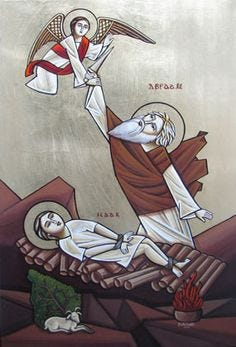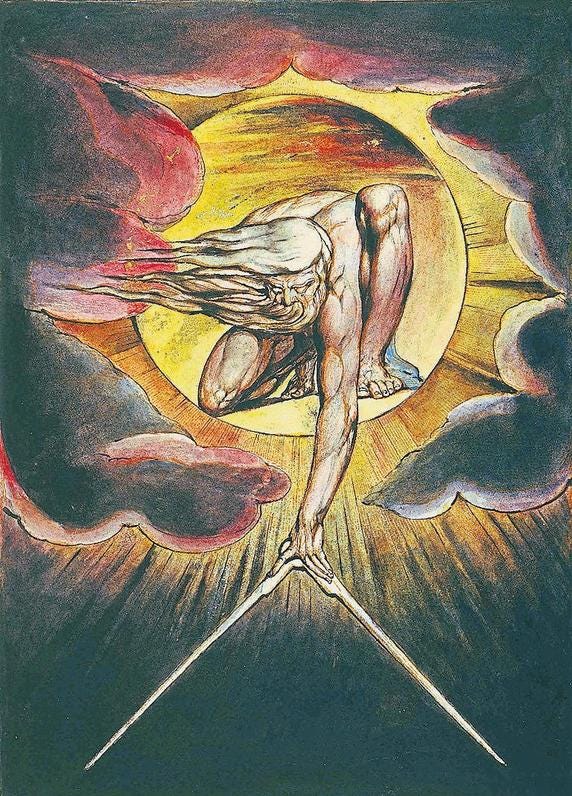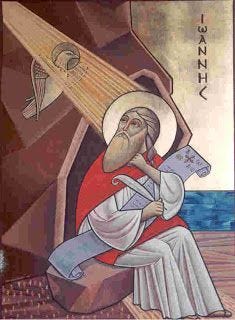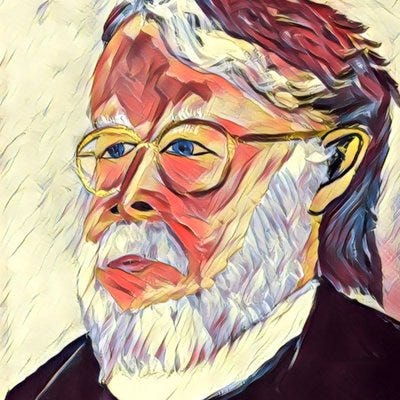Revelation 1.1-20
The two words most often associated with John’s Apocalypse appear no where in it: antichrist and rapture. Neither word occurs anywhere in the Book of Revelation. Nevertheless, it is indeed a bewildering book populated by seven eyed sheep and a woman clothed with the sun, dragons and beasts from the sea. Of the four hundred and four verses of the Lord’s Unveiling to John, two hundred and seventy-eight of them contain one or more allusions to the Old Testament.
The Spirit of Jesus shows the prophet John what the Spirit of Jesus had previously shown the prophets of old.
Revelation is largely a repackaging of Israel’s scriptures; nonetheless, Revelation renders those scriptures strange such that it can be hard to see what bowls and seals and horsemen have to do with an empty grave. The Coptic Orthodox Church reads the Apocalypse in its entirety every year on the eve of Easter— the whole book, all twenty-two chapters. It takes an hour. Even so, it can be difficult to hear these visions as good news.
Therefore, as we set forth into the Apocalypse, in order that we do not drift away from the gospel— it’s only wise and proper— first things first, I need to hand over the goods. I need to deliver to you a promise. Unless you have received a promise from Jesus Christ, unless you’re holding fast to the gospel promise, then the visions and auditions unveiled to John will disorient you and leave you feeling unmoored from the Love with which we are loved. Without a firm grip on the gospel, you are liable to hear what the Seer sees as threat not promise.
So…
First things first—
In the name of Jesus Christ and by his authority alone, I declare for you that the apocalypse has already come to you.
You have died.
You have already died the only death that ultimately matters.
Remember—
The exalted Son of Man, who the Spirit carries John up to see, this Jesus clothed with a golden sash, whose hair is as white as wool, whose eyes are as a flame of fire, whose voice is the roar of many waters, and whose feet— feet that were once pierced and broken by hammer and nail— are now as strong as burnished bronze, this Jesus is the Jesus who appeared to Stephen upon his stoning.
This is the Risen Jesus who blinded Saul on the road to Damascus.
This is the Jesus who gives to Paul the promise to announce to the Church at Corinth, “Because the one man died for all, all have died.”
All have died with him. All have died in him. All have died to sin.
“He loosed us from our sins in his blood,” John writes in Revelation 1.5
“If anyone is in Christ,” Paul writes, “he is a new creation. The old creation has passed away; behold, the new has come.”
In other words, the apocalypse has already come to you.
Therefore, when it comes to John’s forthcoming visions of God’s wrath and his imminent auditions of divine judgment, fear not.
As the Son of Man says to the Seer, “Fear not!”
Hear the good news:
The rumors of grace, pardon, and the redemption of all things are true.
Everything is going to be ok.
You are safe in Christ. You are free. You are free to enjoy your forgiveness because Jesus, the Friend of Sinners, is the Exalted Son of Man.
Fear not!
Everything is going to be ok. The apocalypse has already come to you. You have died. By water and the Spirit, you have died the only death that ultimately matters. And this same Jesus, with whom and in whom you have died already, holds the keys of hell.
This same Jesus, who became our neighbor and loved us as himself, even while we were yet his enemies— loved us even unto a cross, is the entirety of existence, the totality of all that is. “The first and the last,” he unveils to John at the beginning. “The Alpha and the Omega,” he reveals at the end.
Everything is going to be okay because he will be all in all. The apocalypse has already come to you. And nothing you do can undo it.
Because notice—
As fixed to him as his burnished feet and his face shining like the sun, the Exalted Son of Man appears everywhere surrounded by seven lampstands. They are an irremovable part of him. The lampstands, Jesus unveils to John, are his body. The church.
Thus, there is now no Risen Jesus without you.
The Father desires the Son, but there is now no Son apart from his body.
Therefore, you are home free.
Everything is going to be ok.
Having handed over the goods up front, I invite you now to listen to the Word of God as it’s found in the Apocalypse to John, 1.9-20:
I John, your brother and partaker with you in the tribulation and kingdom and patience which are in Jesus, was in the isle that is called Patmos, for the word of God and the testimony of Jesus. I was in the Spirit on the Lord’s day, and I heard behind me a great voice, as of a trumpet saying, What thou seest, write in a book and send it to the seven churches: unto Ephesus, and unto Smyrna, and unto Pergamum, and unto Thyatira, and unto Sardis, and unto Philadelphia, and unto Laodicea.
And I turned to see the voice that spake with me. And having turned I saw seven golden candlesticks; and in the midst of the candlesticks one like unto a son of man, clothed with a garment down to the foot, and girt about at the breasts with a golden girdle. And his head and his hair were white as white wool, white as snow; and his eyes were as a flame of fire; and his feet like unto burnished brass, as if it had been refined in a furnace; and his voice as the voice of many waters. And he had in his right hand seven stars: and out of his mouth proceeded a sharp two-edged sword: and his countenance was as the sun shineth in his strength.
And when I saw him, I fell at his feet as one dead. And he laid his right hand upon me, saying, Fear not; I am the first and the last, and the Living one; and I was dead, and behold, I am alive for evermore, and I have the keys of death and of Hades.
Write therefore the things which thou sawest, and the things which are, and the things which shall come to pass hereafter; the mystery of the seven stars which thou sawest in my right hand, and the seven golden candlesticks. The seven stars are the angels of the seven churches: and the seven candlesticks are seven churches.
This is the Word of God for the People of God.
Thanks be to God.
There is an old joke that insists people don’t go to church because of the people who do; likewise, I think a good many people steer clear of the Book of Revelation because of the people who have hyper-canonized it. But there is no reason to abandon the Apocalypse to the Christian fringe. In fact, once you leave Left Behind behind, Revelation’s continuity with Israel’s scriptures becomes altogether unavoidable.
Indeed most of the narrative details in John’s prophetic call echo Old Testament elements.
For instance, like the prophet Amos, John sees the voice of God.
“And I turned about,” John writes, “to look at the voice which was speaking to me.”
Earlier in the passage, the Lord’s self-ascription (“the One Who Is and Who Was and Who is Coming) recalls the unutterable name God reveals to Moses at the Burning Bush. The seven spirits and seven eyes and seven lampstands form the vision given to the prophet Zechariah. The Lord Jesus’s feet and eyes and hair and dress all resemble the Ancient of Days who was disclosed to the prophet Daniel. And the voice that roars like many waters is the same voice that attends the arrival of God’s glory to the prophet Ezekiel by the waters of Babylon. Even Jesus’s face shining like the sun— there is nothing new here.
And, of course, if Jesus has always been in the Trinity, then we should expect to find this continuity between the Risen Jesus unveiled to John and the Risen Jesus who appeared to Israel’s prophets from the last future.
What is new in this (the New Testament’s only) prophetic book, what is unique and different, is the Apocalypse’s treatment of time, its palpable and harried sense that the Fulfillment is nigh.
John the Beloved Disciple writes down his visions and auditions and sends them out to the churches not only because the Lord instructs him to do so but because he believes the matter is urgent.
Time is short.
John’s convinced the End is imminent.
“The time is near,” the first beatitude announces in the Apocalypse’s prologue.
“Write then what you see,” Jesus commands John, “for these things are about to come to pass.”
Soon and very soon.
Perhaps not surprisingly, ever since John wrote down what he saw, Jesus’s disciples, over and again, have ignored the admonishment that Jesus gave to his first disciples.
In Mark’s Gospel, Jesus predicts the destruction of the temple, and the twelve disciples respond by asking the obvious question.
“When?”
“‘Tell us, when will this be, and what will be the sign?””
And immediately Jesus cracks the whip, chastising his disciples “Do not be led astray by asking “When?””
“Only the Father knows the day and the hour,” Jesus warns them.
That is—
“When?” is a question that cannot be answered; therefore, “When?” is a question that should not be asked.
Do not be led astray by the when question, Jesus warns. Do not get distracted, trying to read the signs of the times, Jesus scolds. Do not get preoccupied, attempting to make predictions, Jesus reprimands.
In other words, leave Left Behind behind.
But no sooner does John the Seer write down what he saw than many of the believers for whom he wrote grew distracted by that very question.
For example, the year 500 AD proved too auspicious to avoid speculation. Long before Dan Brown or that purple haired lady on the Trinity Broadcasting Network, ancient Church Fathers— legitimate thinkers and leaders— like Hippolytus of Rome and Irenaeus of Lyon predicted Christ would come again in the year 500. And they attempted to prove their prediction by “decoding” the dimensions of Noah’s ark.
Pope Sylvester II predicted the apocalypse would occur at the turn of the first millennium, Y1K. When Jesus did not come again to judge the living and the dead, Sylvester and others regrouped and insisted that the only detail they’d gotten wrong was the starting point. The End would come not a thousand years after Jesus’s birth as they’d thought but a thousand years after his death, 1033 AD.
Joachim of Fiore was a Catholic mystic who discovered what he called the secret “eternal gospel” in the Book of Revelation, 14:6. According to him, Christ would come back and inaugurate the Age of the Spirit in 1260 AD.
Flash forward a couple hundred years and it gets worse.
Thomas Muntzer was an Anabaptist in Germany— a Mennonite— who scoured the scriptures to interpret the signs of his time. Muntzer became convinced that the world teetered at a tipping point. He predicted that the New Age would arrive in the year 1525. The revolutionary furor his prediction unleashed ignited a violent rebellion by the peasants in central Germany. The revolt was quelled with equally great violence. The when question led Thomas Muntzer was led astray and before he knew it ploughshares and pruning hooks were being beaten into swords.
John Wesley, the founder of the Methodist movement— otherwise, kind of a normie guy, he got led astray too. He read a verse— a single verse— in Revelation and came to the conclusion that the apocalypse would be in 1836.
Not long after Wesley, a Baptist preacher named William Miller led a movement of believers called the Millerites. William Miller got more specific than any Christian heretofore had dared. Based on his idiosyncratic reading of Daniel 8, William Miller insisted that the Lord would return (to upstate New York) on October 22, 1844.
As it turns out, the most remarkable event that happened on October 22, 1844 was that President James Polk had urinary bladder stones removed. Well, the bladder stones came in second place after what the press dubbed “The Great Disappointment” referring to Miller’s failed prediction. The Great Disappointment didn’t stop William Miller though; his movement of Millerites became known as the Seventh Day Adventist Church.
Christians on cable television went nuts as the year 2000 approached.
When Barack Obama became president, Jerry Falwell predicted the End was nigh.
And maybe you recall—
Family Radio host and self-taught Bible expert, Harold Camping, predicted the rapture would happen on May 21, 2011, paving the way for the destruction of the world’s remaining sinners a few months later on October 21, 2011. Harold Camping led hundreds, likely more, so astray they quit their jobs, left their families, sold their homes, and cashed out their 401Ks in anticipation of the end times. As a result, one of Camping's coworkers committed suicide.
When it comes to Christ’s Second Advent, there’s a better question to ask than “When?” Not only is it a better question to ask, it’s a question Christ does not forbid us to ask. The question we should ask is not “When?” but “Why?”
Why has the End with a capital E not yet come?
Why has Christ not yet come again?
Why does God give more time?
Remember—
The Bible is absolutely unique in the history of religion. Unlike the paganism of ancient Rome and Greece, the scriptures do not view the universe as eternal. Likewise, the Bible departs from eastern religions which understand existence as circular, an endless cycling loop of reincarnations. No, the Book of Genesis and the Gospel of John alike claim that creation had a beginning. Before anything was God spoke all that is into existence. Creation had a beginning and, thus, creation will have an end. Time, according to Christianity, is less like the reliable constancy of grandfather clock and more like the sand in an hour glass.
Time will run out.
Just as there was a first day, one day there will be a last day. God is bringing history to a head. This is what Paul means when he writes to the Church at Rome, “Your salvation is nearer than when you first believed.” As we pray at the table, one day Christ will come back in final victory, time will be transformed into glory, and we will, as the catechism puts it, enjoy him forever.
Why the meantime?
Why does time not simply stop? Why does God let history continue? What else is there for God to do? Christ himself says from his cross, “It is finished.” And on his way to the cross, Jesus declares, “Take heart. I have overcome the world!”
So why?
Why does God give us more time?
What else is there for God to do?
He’s already given himself for sins, once for all. As the author of the Book of Hebrews says, Christ our Great High Priest has offered a perfect sacrifice such that, now, his work forever complete, he sits at the Father’s right hand, resting with his feet propped up on his enemies— Sin, Death, and the Devil. They are now his ottoman. If there is therefore now nothing in all of creation that can separate us from the love of God in Christ Jesus our Lord, what in the world is left for God to do?
Why the delay?
Why does God give us more time?
What is still going on that absolutely must be done?
When I was a student at Princeton, I attended a series of lectures the late Lutheran theologian, Robert Jenson, delivered for undergraduates and faculty members. Though the attendees recognized that Jenson was one of the most brilliant theologians America has ever produced, not every one in the lecture hall was open or hospitable to the claims of Christianity.
Some listeners, though curious, were openly hostile to the gospel.
One skeptical student in the audience persisted in trying to poke holes in Jenson’s arguments.
“Doesn’t the New Testament indicate that the world was about to end? Didn’t Paul and the apostles expect Christ to return in their lifetimes? Didn’t Jesus even suggest the apocalypse was imminent? Why has God delayed?”
And Jenson revealed the slightest crease of a smile, and he responded nonchalantly to the skeptic’s question with a brilliant six word reply.
“Why has God waited?
His answer:
1) Because
2) He
3) Wants
4) To
5) Include
6) You
Why the meantime?
Because he wants to include you.
He delays the End so that by water and the spirit the apocalypse of saving faith might come to you too.
He wants you to hear that heaven is a gift everyone already has by the death of the lamb slain from the foundation of the world. He wants you to hear that your sinful deeds will not be judged because the whole world died to the law by the Body of Christ. He wants you to hear your good deeds are not required nor will they be rewarded for Christ is the end of the law; so that, everyone who believes may be justified. He wants you to reach out by faith and cling to this, the only promise that can save you.
Why does God give us more time?
What is still going on that absolutely must be done?
The proclamation of the promise.
The gospel.
The word of the cross.
Just wrap your head around it—
The only reason left for history to happen is simply for you and I to tell another that Jesus lives with death behind him.
And therefore his promises— of grace and pardon and the redemption of all things— are irrevocable because they are not bounded by death.
That’s not my opinion, and it’s not some dead theologian’s interpretation. This is red-letter, straight from the lips of Jesus. Christ has not yet come again because in this meantime Christ has given us a commission.
God has given us time to proclaim, in word and deed, the glad tidings of his resurrection from the dead. The good news— not only is this message the main thing, it’s literally the only reason any of us are still here. The hour glass would be empty by now except for the fact that God wants to include more than just you.
The promise for you— it’s also our vocation.
Maybe you’ve read it.
Ernest Hemingway wrote a short story for Esquire magazine in 1936 entitled, “The Horns of the Bull.” Hemingway later changed the title to “The Capital of the World” for his collection The Fifth Column.
Set during the Spanish Civil War, the story features a young waiter named Paco, a common Spanish name. Paco aspires one day to be a matador like the men he serves at his restaurant. Paco, the reader learns, ran away from home after a bitter falling out with his father. Paco’s father, however, is determined to find his lost but loved child and to bring him back home. After combing the streets and shops of Madrid to no avail, Paco’s father grows desperate. He spares no expense, taking out a full-page advertisement in the newspaper.
The ad is as plain and clear as a street sign.
The ad reads simply, “PACO, MEET ME AT THE HOTEL MONTANA. NOON TUESDAY. ALL IS FORGIVEN. PAPA.”
When Paco’s father arrives at the hotel plaza at noon on Tuesday, he cannot believe his eyes. A squadron of police officers has been dispatched there to control a crowd of nearly a thousand young men, all named Paco, all of them looking to reconcile with their father.
All of them needed to hear, longed desperately to hear “ALL IS FORGIVEN.”
Jesus warns us not to get distracted trying to read the signs of the time because we’re supposed to be the sign the Father has posted in the world.
At great cost.
And the Father has given us literally all the time in the world to be that sign.
We are the sign that says: YOUR FATHER IS NOT MAD AT YOU— HE’S BEEN SEARCHING FOR YOU. YOU’RE SAFE TO COME HOME. ALL IS FORGIVEN.
And any other contradictory messages we put out there in the world, we’re WASTING TIME.



















Share this post